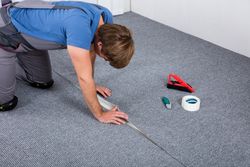
While other flooring options such as hardwood and tile have dominated home improvement plans over the last few decades, carpet has remained a popular possibility. Found in bedrooms, hallways, staircases, home offices, and playrooms around the country, carpeting offers insulation, luxurious feel, and noise reduction benefits. Here, learn about some of the most common carpet types to determine what’s right for your flooring project.
What Kinds of Carpeting Should I Consider?
1. Polypropylene
Also called olefin, polypropylene is a durable choice with a wool-like texture. Impervious to mold and mildew as well as static electricity, polypropylene can be used in both indoor and outdoor applications, including stairwells, greenhouses, and outdoor kitchens. While the carpeting’s oil-heavy fibers collect dirt, they resist staining and are easy to clean.
2. Acrylic
 Often blended with wool and other carpet fiber types for affordability purposes, acrylic carpets offer fade, moisture, mildew, and mold resistance.
Often blended with wool and other carpet fiber types for affordability purposes, acrylic carpets offer fade, moisture, mildew, and mold resistance.
Sometimes labeled as “synthetic wool,” acrylic has a shorter lifespan than other types of carpets and wears easily in high-traffic areas such as front halls and stairs. It can also turn a brownish hue if it’s stained with alkaline products.
3. Nylon
A soft type of carpeting that holds up to furniture weight, moisture, soil, wear, and mildew, nylon retains its dye to avoid premature fading. Its feel, durability, and stain resistance properties make it ideal for homes with young children or high traffic.
However, stain-proofing treatments are usually optional and must be requested. Nylon can also create static electricity upon contact with abrasive agents.
4. Wool
The 100% natural, sustainable carpet fiber is among the more expensive choices. However, it offers benefits such as incredible softness, durability and longevity, stain resistance, and hypoallergenic properties.
This flooring option is perfect if you or anyone in your home has allergies or asthma, with the chemical-free flooring also helpful in maintaining indoor air quality. The main drawback is the lack of mold and mildew resistance, so do not use wool carpeting in your basement or other humid areas of your home.
5. Polyester
Yet another synthetic fiber that’s easy to maintain and resistant to stains, polyester is also non-allergenic and holds color well. However, polyester flattens under the weight of furniture and other heavy materials and retains oil stains. Polyester carpeting also comes in PET versions, or those made with fibers from plastic containers and bottles.
Find the right carpet for your home at Apex Flooring Services LLC. Serving the Atlanta Metro Area and the surrounding cities in Georgia, this flooring company offers one-year installation warranties and lifetime product warranties. Call the licensed, insured, and dependable contractors today at (770) 256-8633 to schedule a free estimate or learn more about carpet selection online. See the latest completed projects on Facebook.
About the Business
Have a question? Ask the experts!
Send your question

